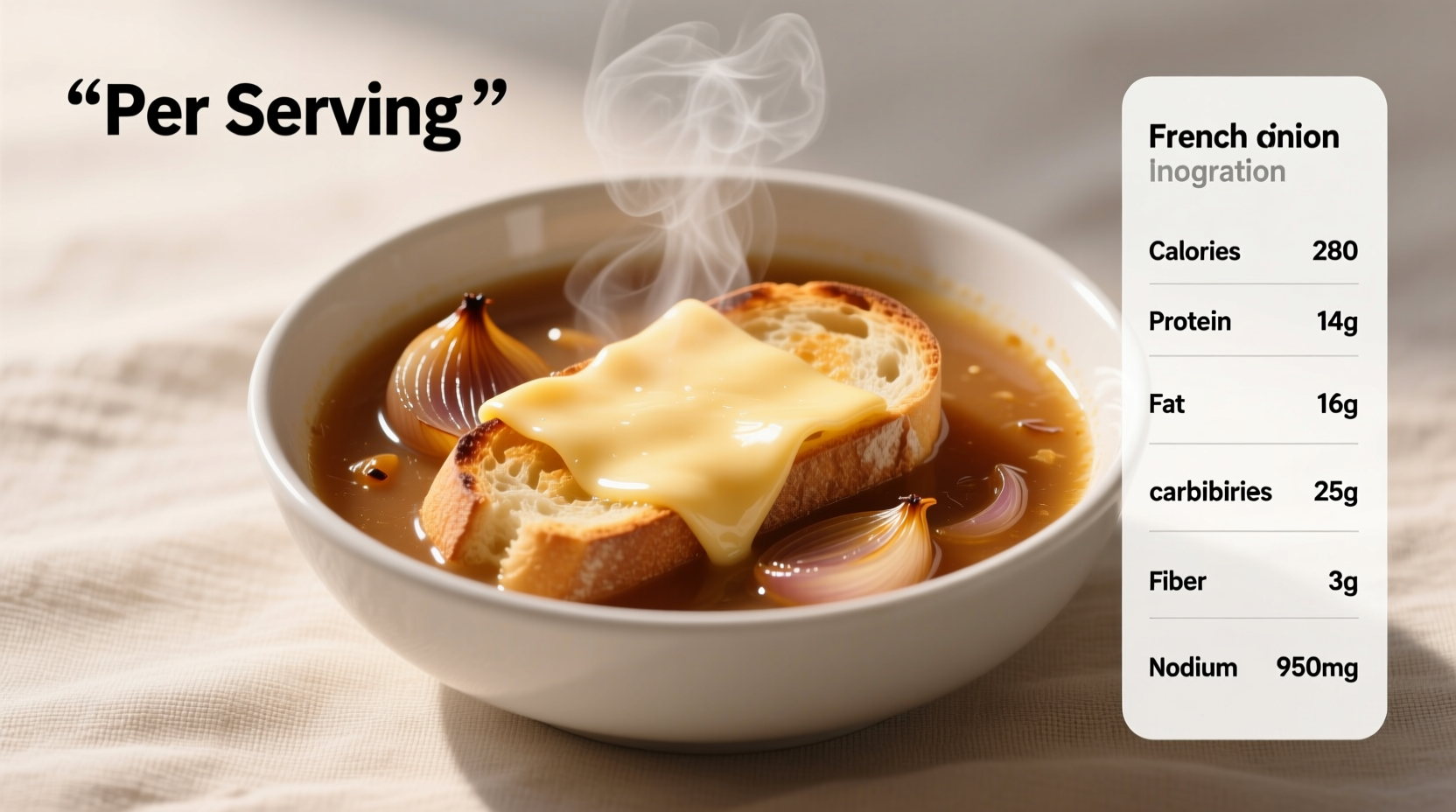One cup (245g) of traditional French onion soup contains approximately 190 calories, 8g fat, 24g carbohydrates, 6g protein, and 980mg sodium. While rich in flavor, it's notably high in sodium and moderate in calories compared to other soups, but offers beneficial nutrients from onions including vitamin C, potassium, and antioxidants.
What You Really Need to Know About French Onion Soup Nutrition
When you order French onion soup at a restaurant or make it at home, you're getting more than just comfort food. Understanding the nutritional value of French onion soup helps you make informed dietary choices without sacrificing flavor. This classic French dish packs a flavorful punch, but its nutritional profile varies significantly based on preparation methods and ingredients.
Complete Nutritional Breakdown Per Serving
A standard 1-cup (245g) serving of traditional French onion soup provides these essential nutrients:
| Nutrient | Amount | % Daily Value* |
|---|---|---|
| Calories | 190 | 9% |
| Total Fat | 8g | 10% |
| Saturated Fat | 4.5g | 23% |
| Cholesterol | 20mg | 7% |
| Sodium | 980mg | 43% |
| Total Carbohydrates | 24g | 9% |
| Dietary Fiber | 2g | 7% |
| Sugars | 6g | - |
| Protein | 6g | 12% |
| Vitamin C | 15% DV | - |
| Potassium | 10% DV | - |
*Percent Daily Values based on a 2,000 calorie diet. Source: USDA FoodData Central
Why Sodium Content Matters in French Onion Soup
The most significant nutritional consideration in French onion soup is its sodium content. At nearly 1,000mg per serving, it provides 43% of your recommended daily sodium limit. This high sodium level primarily comes from the broth and added salt during preparation. According to the American Heart Association, most adults should consume no more than 2,300mg of sodium daily, with an ideal limit of 1,500mg for optimal heart health.
Restaurant versions often contain even higher sodium levels—sometimes exceeding 1,500mg per serving—due to concentrated broths and additional seasoning. When analyzing the nutritional facts of French onion soup, sodium should be your primary consideration if you're monitoring blood pressure or following a heart-healthy diet.

Health Benefits Hidden in This Classic Dish
Despite its sodium content, French onion soup offers several nutritional advantages you might not expect. The star ingredient—onions—provides valuable nutrients that contribute to the soup's health benefits of French onion soup:
- Antioxidants: Onions contain quercetin, a flavonoid with anti-inflammatory properties studied for potential cardiovascular benefits
- Vitamin C: One serving provides about 15% of your daily vitamin C needs, supporting immune function
- Potassium: Helps regulate blood pressure and fluid balance
- Dietary fiber: From caramelized onions, supporting digestive health
Research published in the Journal of Food Science confirms that the cooking process enhances certain beneficial compounds in onions, particularly when slowly caramelized as in traditional French onion soup preparation.
How French Onion Soup Fits Into Different Diets
Understanding where French onion soup fits within various dietary approaches helps you make informed choices:
Low-Carb and Keto Diets
With 24g of carbohydrates per serving, traditional French onion soup isn't keto-friendly. However, reducing the onions to 1-2 cups instead of the typical 4-6 and using a low-carb broth can create a version with approximately 12g net carbs per serving—more suitable for moderate low-carb diets.
Heart-Healthy Eating
The saturated fat content (4.5g per serving) and high sodium make traditional French onion soup challenging for strict heart-healthy diets. Using reduced-sodium broth and finishing with olive oil instead of butter can significantly improve its cardiovascular profile while maintaining authentic flavor.
Calorie-Conscious Eating
At 190 calories per serving, French onion soup falls in the moderate range for soups. It's substantially lower in calories than cream-based soups (which often exceed 250 calories per serving) but higher than broth-based vegetable soups (typically 100-150 calories).
Nutritional Comparison: French Onion Soup vs. Other Popular Soups
How does French onion soup stack up against other common soup options? This comparison helps contextualize its nutritional value compared to other soups:
| Soup Type | Calories (per cup) | Protein (g) | Sodium (mg) | Notable Nutrients |
|---|---|---|---|---|
| French Onion | 190 | 6 | 980 | Vitamin C, Potassium, Antioxidants |
| Chicken Noodle | 120 | 7 | 800 | Protein, B Vitamins |
| Tomato Basil | 150 | 3 | 700 | Lycopene, Vitamin A |
| Cream of Mushroom | 220 | 4 | 850 | Vitamin D, Selenium |
| Minestrone | 180 | 5 | 600 | Fiber, Multiple Vitamins |
Creating a Healthier Version at Home
You don't need to sacrifice flavor to improve the nutritional profile of French onion soup. These chef-tested modifications maintain authenticity while boosting nutritional value:
- Reduce sodium by 30%: Use low-sodium broth and enhance flavor with herbs like thyme and bay leaves instead of additional salt
- Boost vegetable content: Add mushrooms or leeks along with onions to increase fiber and nutrient density without significantly altering flavor
- Healthy fat substitution: Replace half the butter with olive oil to reduce saturated fat while maintaining rich flavor
- Protein enhancement: Stir in 1-2 tablespoons of nutritional yeast for a cheesy flavor with added B vitamins and protein
- Portion control: Serve in a smaller bowl (1.5 cups instead of 2) to reduce overall calorie and sodium intake
According to culinary research from the American Culinary Federation, these modifications can reduce sodium by up to 35% and saturated fat by 25% while maintaining the characteristic rich flavor that makes French onion soup so beloved.
When French Onion Soup Fits Your Nutritional Goals
French onion soup can be part of a balanced diet when consumed mindfully. It works particularly well as:
- A starter course before a lean protein and vegetable main dish
- An occasional comfort food when following a generally balanced eating pattern
- A source of hydration and electrolytes during cold weather (when sodium needs may be slightly higher)
- A vehicle for increasing vegetable consumption through its onion base
For those monitoring specific health conditions, consulting the USDA's MyPlate guidelines can help determine appropriate portion sizes and frequency of consumption based on individual nutritional needs.











 浙公网安备
33010002000092号
浙公网安备
33010002000092号 浙B2-20120091-4
浙B2-20120091-4